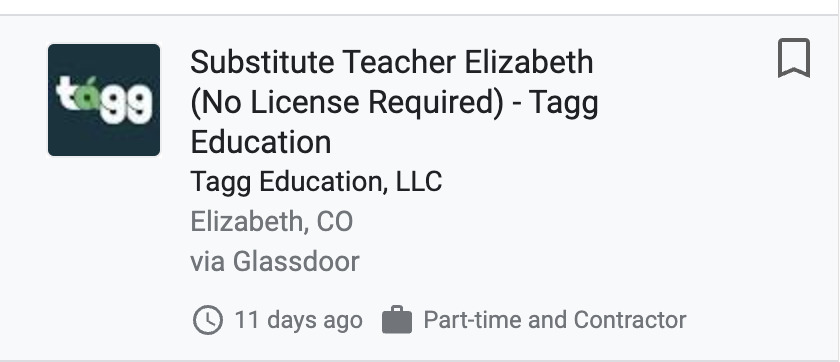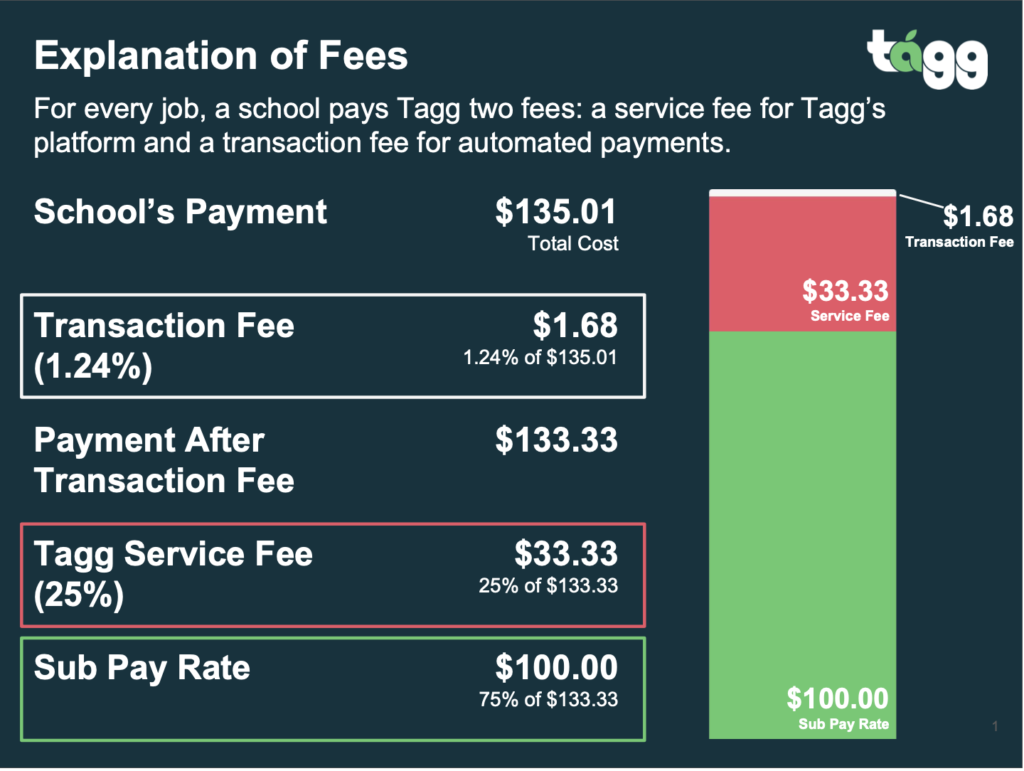Elizabeth School District Superintendent Dan Snowberger submitted a request last November asking Colorado’s Board of Education to waive the state’s licensure requirement for substitute teachers serving in the district’s public school classrooms.
The small district, which serves fewer than 2,500 students, is only the second to make ask for a waiver from the state board, which will vote on the matter when it meets this month. Falcon School District 49 (D49) in El Paso County was granted a substitute license waiver in 2018.

While it’s common for charter schools, which generally have more flexibility in their operations, to waive licensing requirements for teachers and substitutes, the Colorado Department of Education (CDE) holds public schools to a higher standard regarding who they employ for teaching positions, including temporary ones.
According to Tanya Klein, CDE’s director of educator licensing, the bar isn’t all that high. “Anyone with a high school diploma who passes a background check and can attest to some level of experience working with children can apply for a one-year authorization license from the state. The process from application to approval takes around three weeks, but districts can expedite an application by calling the department,” she said.
Districts either have interested candidates apply directly through a substitute job posting on their website or a job-listing site like Indeed.com. They manage payroll for these employees or partner with a third party to recruit, screen, train, hire, place and manage applicants.
While Klein acknowledged districts are facing employee shortages, the state has done everything it can to help, including revising the one-year authorization requirements in 2021.
Hiring Non-Licensed Subs through Tagg Education
Snowberger said the waiver request is the result of a collaborative effort among the district’s Teacher Advisory Committee and principals to help fill substitute positions, despite some community members claiming there was little discussion with the school board and that the district didn’t notify the parents by email.
Allowing non-licensed subs to work in Elizabeth classrooms would allow Snowberger to fully take advantage of a contract the district signed in June 2023 with Tagg Education (Tagg), an app-based service that matches a pool of users with open substitute spots.
While Tagg conducts complete background checks on applicants, it doesn’t require users to hold a substitute teaching license. Without a waiver from the state, Elizabeth has only been able to hire substitutes who were with the district prior to signing with Tagg or who have an active license.
“Tagg has recruited some licensed subs for us, and they had some licensed subs in the system from the Denver metro area that we’ve been able to access. But again, we’re still seeing the same fill rate because the pool of licensed subs in the Denver Metro area is still very small,” said Snowberger.
When asked about Tagg job listings for non-licensed substitutes that appeared on the job site Glassdoor, Snowberger said the company has begun recruiting candidates in the event the district is granted its waiver request.

However, a list of substitutes who worked in Elizabeth schools last Fall supplied by Tagg includes one who started subbing two weeks before her license became active and three others who didn’t appear in CDE’s online licensing search.
Klein said the state doesn’t monitor hiring substitutes through third-party services unless the position is for a long-term substitute.
Conflict of interest?
Tagg was founded in January 2018 by Trevor Miller, son of Brad Miller, a conservative attorney whose law firm represents many charter schools and school boards across the state, including Elizabeth and Woodland Park, and his cousin Andrew Lundeen, whose dad, Senator Paul Lundeen, serves on the Senate Education Committee.
Snowberger denies that Brad Miller had anything to do with awarding the contract and is adamant that he offered no legal representation on the matter. Still, the senior Miller didn’t sign a conflict of interest agreement before the district signed the contract, despite having admitted he has a financial interest in the company.
Snowberger said he’s been aware of Tagg’s services since he was the superintendent in Durango and struggling to fill substitute teaching jobs, though the district never hired the company. So when he came to Elizabeth and heard his principals and teachers were struggling to cover open classrooms, he suggested ending the district’s contract with Frontline Education and hiring Tagg instead.
According to Snowberger, Frontline doesn’t actively recruit substitutes, which is what he felt his district needed. Plus, he said the Tagg platform allows school administrators to rate a substitute up to five stars. Anyone with two stars or fewer isn’t eligible to work in the district, and he plans to fill open positions with licensed subs before non-licensed ones.
Snowberger didn’t mention any other connection to Tagg, although the company listed its initial address with the Secretary of State as the same address for Education ReEnivisioned BOCES, where he, Woodland Park School District superintendent Ken Witt and Brad Miller worked together from March 2022 to June 2023. The company’s current address in Colorado Springs is listed as a property belonging to Brad Miller.
Snowberger also worked as a zone superintendent for D49, which began using Tagg after the state board granted its substitute licensure waiver in 2018 and just six months after the company opened.
Financial incentive to work with public schools
Miller and Lundeen’s company can recruit a larger pool of “uber-like” workers who log in and accept a substitute job by not having them apply with the state first. However, this also limits the schools they can work with to charters and private institutions.
Colorado has around 270 charter schools and 2,000 public schools. Opening their services to public schools could exponentially increase their bottom line.
According to the company’s contracts with D49 and Elizabeth, schools pay a service fee of 25% of the total pay for a given job. For example, if the total pay for a substitute job were $100, Tagg would receive $25, and the substitute would receive $75. Elizabeth also pays a $1,000 monthly subscription fee for “features and functionality related to the Tagg Platform.”

Snowberger said that despite the high service fee, there is no cost difference between using Tagg and its prior service provider, Frontline.
However, after a public records request, the district was unable to provide a copy of its contract with Frontline, stating, “Because the district had worked with Frontline for many years, the original contract is likely beyond the scope of the timeframe for records to be kept.”
Snowberger also said the district doesn’t pay a service fee for substitutes already employed with Elizabeth before joining Tagg and that the 25% service fee is equivalent to what the district was paying in PERA costs through its payroll. PERA is a substitute for social security for government employees.
Tagg users are contract employees, which Snowberger said means that the company doesn’t have to contribute to PERA. However, on June 30, 2023, PERA sent an email to school districts clarifying that all substitute teachers must be members of PERA regardless of whether the school or district fills those roles using a third party, meaning employer contributions are still due.
PERA said it was taking this position because “substitute teachers are being treated inconsistently across schools and districts and are losing out on PERA service credit. Further, there is a negative impact to the School and DPS division trust funds if they are not receiving contributions on all substitute teachers. Finally, classifying substitutes as non-PERA members avoids working after retirement contributions and rules, which has a long-term negative impact on the trust fund.”
Tagg didn’t respond to a request for comment.
State board narrowly grants D49 2018 request
When D49’s chief education officer, Peter Hilts, asked the state board to approve his district’s substitute license waiver request, he argued many of the same points as Snowberger. He said granting the waiver would open the pool of available substitutes and limit disruptions caused when classes went uncovered.
The board approved the request 4-3 along party lines, with the Republicans voting yes and the Democrats voting no. The Democratic board members were concerned that saying yes to D49 would open an onslaught of requests from other districts and lower the state’s already lax substitute teaching standards.
Hilts didn’t tell the state board that the district planned to hire Tagg to begin recruiting and supplying non-licensed substitutes for open positions. Yet one month after approval in June, Brad Miller admitted to having a financial stake in Tagg in July and signed a conflict of interest agreement with the district. In October, the district finalized its contract to pilot the Tagg platform in several schools.
Hilts also stipulated to the state board that the district would “provide to the Colorado Department of Education (CDE), the State Board, CDE or entity designated by the State Board evidence of the quality standards, performance, and evaluation of substitute teachers hired pursuant to this waiver.”
A public records request for evidence that D49 followed through with its promise to evaluate substitutes hired after the waiver turned up no applicable documents, and a CDE representative confirmed they hadn’t received any evaluations from D49 since the board’s approval.




